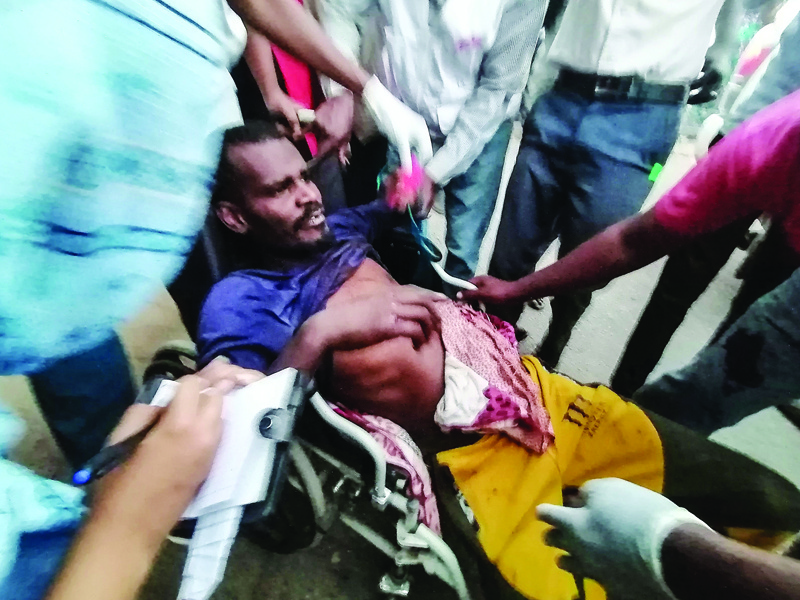 KHARTOUM: Sudanese protesters carry an injured man to safety during an anti-coup demonstration in the Khartoum Barre neighborhood, outside the capital. - AFP
KHARTOUM: Sudanese protesters carry an injured man to safety during an anti-coup demonstration in the Khartoum Barre neighborhood, outside the capital. - AFP
KHARTOUM: Sudanese security forces have arrested the bureau chief of Qatari-based Al Jazeera TV, the network said yesterday, a day after the latest crackdown on anti-coup protesters left at least six dead. Among those killed were two teenagers, according to a medics' union. It was one of the bloodiest days since a coup almost three weeks ago, derailing a transition to full civilian rule, sparking international condemnation and provoking regular protests. Sudan has a long history of military coups, enjoying only rare interludes of democratic rule since independence in 1956.
"Security forces raided the house of Al-Musalami Al-Kabbashi, the Al Jazeera bureau chief in Sudan, and detained him," the network said on Twitter without elaborating. Al Jazeera has given prominent coverage to demonstrations against the October 25 power grab, but last week it also aired a detailed interview with top general Abdel Fattah Al-Burhan. The protests, including by tens of thousands of people nationwide on Saturday, have continued despite internet outages forcing demonstrators to communicate via graffiti and SMS messages.
Among those killed on Saturday was Alsheikh Yasser Ali, 18, who was protesting in Khartoum's twin city of Omdurman to demand civilian rule. "I attended the body's autopsy, which showed that he took a bullet to the shoulder which hit the heart and the lungs," his uncle Zaher Ali told AFP. "I almost collapsed in the morgue." An independent union of medics said a 15-year-old was also among the six killed Saturday. Five were shot dead, while one died from "suffocation by tear gas", the medics said, who have recorded a total of 21 killed since the coup.
Media crackdown
Other media outlets besides Al Jazeera have been targeted since the putsch, when Burhan declared a state of emergency, detained the civilian leadership and removed the government installed after the April 2019 military ouster of autocratic president Omar Al-Bashir. Burhan, de facto head of state since Bashir fell, has sacked the heads of Sudan's state television and the official news agency. The head of media council granting journalist permits has also been switched, and handed back to Abdelazim Awad, who led the council during Bashir's authoritarian rule.
The coup has triggered punitive measures by Western countries and the World Bank, imperiling the impoverished country's need for investment and aid. The United Nations has called on security forces to show restraint, in a country where more than 250 people had already died in mass protests leading to Bashir's ouster. Yesterday, Britain's Minister for Africa, Vicky Ford, said she was "deeply concerned at reports of protesters killed", adding that Sudan's "military must listen to the huge numbers calling for restoration of the democratic transition."
Earlier, Washington's embassy in Khartoum said it regretted the loss of life and injuries to "dozens of Sudanese citizens demonstrating...for freedom and democracy." Gunshots were heard and tear gas fired as security forces tried to break up Saturday's protests, witnesses and AFP correspondents said. But police denied using "live rounds" and said 39 of their personnel were "severely wounded" in confrontations with the protesters, whom they accused of attacking police stations.
Excluded
Hundreds of people also demonstrated in Europe and the United States to support the Sudanese who have remained undeterred despite the deadly toll and arrest of hundreds. In a statement, Al Jazeera strongly condemned "the reprehensible actions of the military", called for it bureau chief's immediate release, and for its journalists to be able to work unhindered without fear or intimidation. The network, which authorities ordered shut for about three months after Bashir's removal, defended the professionalism of its reporting. The broadcaster said it "holds the Sudanese military authority responsible for the safety of all its employees."
The demonstrations came two days after Burhan, despite calls by the West, Saudi Arabia and the United Arab Emirates for a return to the civilian-led transitional government, announced a new civilian-military ruling council with himself as head. It excludes any members of the Forces for Freedom and Change, an umbrella alliance which was the main bloc seeking a transition to civilian rule. Burhan insists the military's move on October 25 "was not a coup" but a push to "rectify the course of the transition". - AFP




